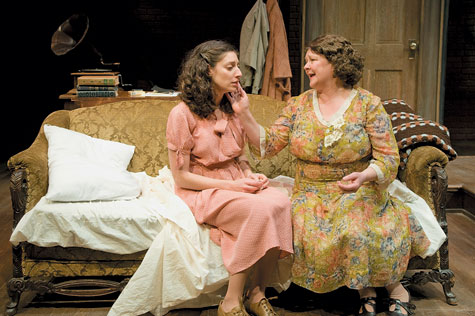
UNDER HER THUMB Buirski and Overly. Photos: PETER GOLDBERG |
Theater classics are at a significant disadvantage: overfamiliarity. How many times can you see Hamlet step toward you at that moment before you start mouthing "To be or not to be . . ." with him? That's similarly true with Tennessee Williams's The Glass Menagerie, which in conventional hands can parade what are by now stock characters: the reclusive sister, the smothering mother, the regretfully resentful son.
Yet under the masterful direction of Fred Sullivan Jr., the Gamm Theatre is revitalizing this drama (through April 4) to the point where the Wingfields seem to be discovering their self-illuminating defeat for the first time.
The most autobiographical of Williams's plays, the title refers to the collection of little glass objects obsessively cared for by Laura (Diana Buirski). She is so painfully shy that she gets physically ill when she has to deal with people besides her mother and brother. At the beginning, her mother Amanda (Wendy Overly) is upset that Laura has spent the past six weeks only pretending to go to a secretarial course they couldn't afford, having dropped out the first day.
You don't disagree with mother, Laura has learned, a lesson never accepted by brother Tom, who has been supporting them with a menial job at a shoe warehouse. He wants desperately to sail away, write poetry, and become his own person. But his mother is always angrily berating him for such "selfish" thoughts, while he equally angrily watches his life draining away in her grip.
The central difference in this take on The Glass Menagerie is that Sullivan has Tom portrayed both young (by Marc Dante Mancini) and old (by Sam Babbitt). This is ingenious rather than gimmicky because Williams has Tom tell us that this is "a memory play" and has him step in to narrate as well as interact in the recollected scenes. So now we can see the white-haired teller of the story as well as the youth he is recalling. Not only do we see young Tom swig from a hip flask, coping with his boxed-in life, we also see who he later becomes: resigned, never without a glass of whiskey in hand.
That underscores the difficulty of portraying Amanda. What fun is there in watching a manipulative shrew practice her craft unless more is going on? Overly makes sure we see the gears working beneath Amanda's imposing façade, creating a character who isn't simply intent on getting her own way but who is — however neurotic and ham-fisted — single-minded about getting her children to do what is best for them. You can dislike her actions and even get mad at her fury, but you can't hate her. We can't trust an Amanda who is sly, but Overly makes her lovingly wrongheaded.
In the beginning, young Tom gives as good as he gets, raging back at her on every occasion. Mancini has a difficult role here, since Babbitt got to present Tom's gentler self, but I needed more modulation of young Tom's early anger; a speaker burns out if not now and then dialed back from 11. We eventually get it, though, when all that previous energy provides a poignant background for Mancini's description of Laura as "peculiar," a sweet assessment, however harsh that may sound.